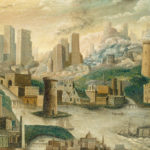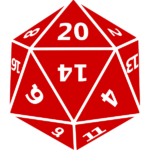Critical Success: Never Split the Party

The first rule of D&D is… always talk about D&D. Incessantly. To anyone who will listen, even if they seem like they don’t want to. Because it’s awesome, and nobody should miss out.
But the second rule is… Never split the party.
If COVID-19 has taught us anything, it’s that we need each other. In D&D, when a party decides to split up, not only does it bog down gameplay, because the DM can only work with half of the group at a time, it usually goes badly for the party, because they depend on each other and each one’s unique skills and ideas.
Christianity has taught this from the beginning. The Bible calls it the Body of Christ.
As it is, there are many parts, but one body. The eye cannot say to the hand, “I don’t need you!” Or again, the head can’t say to the feet, “I don’t need you!” On the contrary, those parts of the body that are weaker are indispensable. But as it is, God has arranged each one of the parts in the body just as he wanted. And if they were all the same part, where would the body be? If the whole body were an eye, where would the hearing be? If the whole body were an ear, where would the sense of smell be? And if the ear should say, “Because I’m not an eye, I don’t belong to the body,” it is not for that reason any less a part of the body. If the foot should say, “Because I’m not a hand, I don’t belong to the body,” it is not for that reason any less a part of the body. Indeed, the body is not one part but many.
1 Corinthians 12:14-22, CSB
We are all different, and each person brings something different to the table. This isn’t just true of the contents of a character sheet, but the actual people, whether sitting around a table or living our lives. When body parts are joined together, they are greater than the sum of their parts. When body parts are separated from the rest of the body, it’s just gross. It’s not good. It shouldn’t be like that.
Because D&D is a community-centric game, we have the opportunity to strengthen the Body well beyond what happens around the table. This is no less true whether the players are Christians or not. We have the opportunity to connect with each other, build friendships, and be there for each other, whether fighting a beholder or depression. A Critical Success party focuses more on player relationships than character relationships, but the latter serves the former. The more an adventure focuses not only on the unique capabilities of each character, but the unique needs and contributions of each player, the more the players appreciate and value each other, the more they’ll enjoy the game, and the more interest they will have in each other beyond the game. Of course, players and DM need to get to know each other in order to make this happen, and that takes time, but by focusing on how valuable each person is and listening for cues that hint at their needs, those personal connections will build.
Ultimately, the goal is that everyone involved knows that they are never alone, that we don’t need to see those around us to know someone has our back, whether in a dark cavern or a dark night of the soul.

